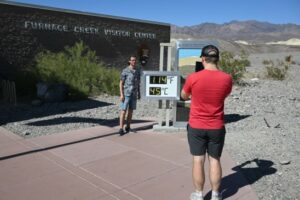A potentially record-breaking heat wave is scorching the U.S. from coast to coast, putting nearly 115 million in harm’s way. Cities including Phoenix and Las Vegas are expected to reach temperatures as high as 118 degrees Fahrenheit this weekend and even break local records for longest periods of high heat. This type of prolonged and intense heat wave is rare and could quickly become deadly in some areas, especially for vulnerable populationssuch as those experiencing homelessness. The National Weather Service has urged people to limit their time outdoors.
- Human-caused climate change has increased the likelihood of extreme weather, including heat waves, Axios writes.
- While high temperatures mostly affect the southwest, Vermont and other states in New England are facing historic flooding.
By Ruiqi Chen, Editor at LinkedIn News
“Stifling” heat wave poses deadly risks from Florida to California, breaks records
Highest temperature forecast, July 13-17, 2023

The heat wave affecting nearly 115 million people in more than 15 states is going to intensify significantly before conditions improve.
Why it matters: The heat is so severe and long-lasting that it constitutes a deadly threat in many areas, particularly across the Southwest and portions of the West. Extreme heat is the top annual weather-related killer in the U.S., and can cause harm indiscriminately and quickly.
- Human-caused climate change is worsening this heat wave by making it more intense, longer-lasting and more likely to occur.
- An initial analysis from research and communications nonprofit Climate Central shows that in some areas affected by this heat wave, climate change has made record-breaking temperatures at least 5 times more likely than in a world without the added amounts of heat-trapping greenhouse gases.
By the numbers: One remarkable aspect of this extreme heat event is how high temperatures are likely to get in cities that are typically thought of as very hot in the summer.
- In Phoenix, each of the past 15 days has reached or exceeded a high temperature of 110°F. The all-time record stands at 18 days, and high temperatures for the next five days or more are forecast to hit or exceed the 110-degree mark, virtually assuring the record will be tied or broken.
- Also in jeopardy is the record for the hottest seven days, to be set from Thursday through July 19. This is partly a result of extremely warm nighttime lows.
- The city may break its record string of days with overnight low temperatures at or above 90°F, and had a low of a steamy 95°F Thursday morning. This was just 1 degree shy of the all-time warmest overnight temperature on record there.
- In Las Vegas, the high temperatures this weekend into early next week are forecast to reach or exceed the city’s all-time record of 117°F.
Of note: In Death Valley, Calif., one of the planet’s hottest places, temperatures could equal or beat its highest reliably recorded temperature in modern records of 130°F.
The big picture: The scope of the heat wave is rare, as is its persistence. The heat reaches from Florida to California and is set to expand its grip to the Great Basin and parts of the Pacific Northwest.
- This extreme event features every type of heat, from sultry air rich with moisture wafting in from the record-warm Gulf of Mexico waters to a blazing, dry heat. Each type is hazardous in its own right.
- El Paso, Texas, has had 28 straight 100-degree days, its longest streak on record — with more to come.
- The weather pattern responsible for the extreme heat consists of a broad and unusually potent area of high pressure aloft, known as a heat dome.
The NWS forecast office in Phoenix noted Friday that the heat dome is of historic intensity, calling it “one of the strongest high pressure systems this region has ever seen.”
- The NWS’ Weather Prediction Center said an “extremely dangerous heat wave will build over the Southwest” this weekend and could extend into next week for some areas.
- When the heat reaches peak intensity on Sunday, temperatures might approach or hit all-time records, particularly in the San Joaquin Valley, Mojave Desert and Great Basin regions, the center said.
- The heat wave could also potentially expand into the South Central states and last through July 22, per the NWS.
What’s next: The latest computer model projections show that even under low-to-medium-emissions scenarios, the number of days above heat thresholds being experienced now is likely to become more routine during the next few decades.
What they’re saying: “Take the heat seriously and avoid time outdoors,” the National Weather Service stated.
- “This heatwave is NOT typical desert heat,” warned the NWS forecast office in Las Vegas. “Everyone needs to take this heat seriously, including those who live in the desert.”
Editor’s note: This story has been updated with additional details from the NWS.
BY: Andrew Freedman, author of Axios Generate







